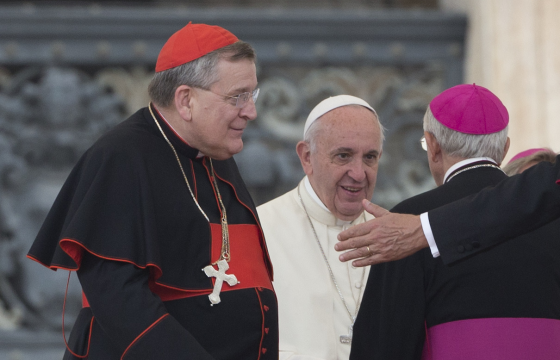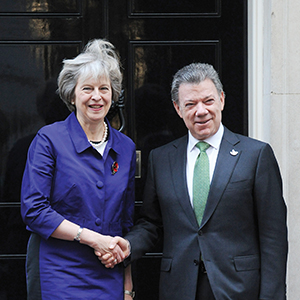The Colombian Government announced this week that it had reached a “new, final accord” with the FARC rebels, after a 2 October plebiscite that rejected the original deal.
The new accord integrates concerns of “No” voters. Revised points address the question of designated congressional seats for FARC members, and the handling of drug-trafficking charges.
President Juan Manuel Santos (pictured with Theresa May earlier this month) said on national television that it was imperative to ratify the agreement quickly because the current ceasefire was “fragile”. The new deal will not face a popular vote and instead will be sent to Congress. Opposition leader Álvaro Uribe said he would review the changes. It is still unclear whether the revisions will placate the “No” voters who deemed the original deal too lenient to former guerrilla rebels. The auxiliary bishop of Barranquilla, Colombia, Víctor Tamayo, said he was very happy with the new agreement and that Colombia was finally breathing the air of peace after 50 years.
The spread of gender theory is misleading so many Catholics that a high-level document may be required to correct the errors of the ideology, Cardinal Willem Eijk of Utrecht, The Netherlands, said last week. The Dutch cardinal was speaking to Catholic News Service in Oxford, where he gave the Anscombe Memorial Lecture at Blackfriars on the theme, “Is Medicine Losing its Way?” A moral theologian and a former medical doctor who worked at the Amsterdam university hospital before he became a priest, Cardinal Eijk, 63, said a papal encyclical or other magisterial document “might appear to be necessary” to counter the spread of the new theory that gender can be determined by personal choice rather than by biology.
Gay marriage block
The Mexican Human Rights Commission and the Constitutional Commission of the Mexican House of Representatives voted down President Enrique Peña Nieto’s initiative to change the constitution to legalise gay marriage in all 32 states. Members of the Mexican clergy had fiercely criticised the constitutional reform. In an 8 November vote, the Human Rights Commission said that states and local authorities should legislate on civil matters. The National Front for the Family brought together religious and lay organisations against the measure and held marches across the country.
Meanwhile, Fr Jose Luis Sanchez Ruiz, the priest who was abducted last week in the state of Veracruz, has been found alive but with signs of torture, the Catholic Church confirmed on Sunday.
Help for Haiti
Catholics in Southern Africa are helping Haiti with a special collection raised from three Sundays in November. Hurricane Matthew struck Haiti in October, causing more than 800 deaths and destroying 90 per cent of crops. It left thousands homeless and in need of food, clean water and health care. “The magnitude of this disaster calls for immediate response of assistance to alleviate the sufferings of our brothers and sisters in Haiti,” said the Bishop of Mthatha and vice-president of the Southern Africa Catholic Bishops’ Conference, Sithembele Sipuka.
Poland’s most controversial post-communist church has been formally opened in Warsaw, 225 years after it was first planned. “We hope our prayers here will make Poles more courageous, responsible and creative in shaping our homeland’s present and future, and in realising the gift of freedom for which previous generations paid the supreme price,” said Archbishop Wojciech Polak, Poland’s Catholic primate. The 51-year-old archbishop was speaking at the end of a Mass to dedicate the Divine Providence basilica in Warsaw’s Wilanow suburb, attended on 11 November, Independence Day, by President Andrzej Duda and Prime Minister Beata Szydlo. He said Cardinal Jozef Glemp (1929-2013), who relaunched the project in 1989, had viewed the £100 million basilica as a “vote of thanks by the Polish nation” for the recovery of its freedom after communist rule and its survival under previous periods of foreign occupation. Plans for the 81,000 square-foot basilica were first conceived under King Stanislaw Poniatowski in the 1790s.
The figure of Martin Luther produced by the German Playmobil line of toys is the most successful single figure the firm has ever produced. By the middle of the Reformation Anniversary Year, in March 2017, Playmobil expects to have sold 650,000 figures of the friar (pictured). In February 2015, the first 34,000 “Little Luthers” sold out in 72 hours.
Roma remembrance call
Austria’s Catholic bishops have urged a “worthy remembrance” of Europe’s Roma or Gypsy communities on the 75th anniversary of the start of their attempted extermination by the Nazis. “Recalling these events leaves us speechless – which words can summarise this suffering? And yet, the silence surrounding it merely fuels a new injustice,” the Bishops’ Conference said at its autumn plenary in Vienna. Deportation of Roma to Nazi concentration camps was “the darkest chapter in a centuries-long history of discrimination”, they said.
According to a Cafod statement ahead of World Aids Day on 1 December, while 25.2 million people are living with HIV in Africa, only 7.6 million are on the lifesaving treatment they need. In its statement, the Catholic development charity drew attention to its work with locally-based organisations such as Kitovu Mobile in Uganda. Kitovu Mobile trains volunteers (pictured) on how to reach out to people in their community, how to overcome the fear of testing due to the associated stigma and discrimination, and how to advise on adherence to treatment if it is needed.
A top UN official has warned South Sudan is on the brink of genocide, as Catholic bishops called for an urgent solution to the strife in the country. Adama Dieng, the UN special adviser on prevention of genocide, said on 12 November that the violence – rooted in a political dispute between President Salva Kiir and Vice-President Riek Machar – was escalating into an outright ethnic war, with potential for genocide.
More than 1 million people – 10 per cent of the population – have fled the country, with 1.3 million others living in refugee camps and 1.6 million displaced inside the country, living in churches, schools and UN compounds.
CDF chief rejects ‘lies’against Stepinac
The Prefect of the Congregation for the Doctrine of the Faith has condemned “lies” told about Croatia’s former Catholic primate, Blessed Cardinal Alojzije Stepinac (1898-1960), and urged Serbian Orthodox leaders to drop their opposition to his expected canonisation, writes Jonathan Luxmoore.
“The cardinal resisted a totalitarianism which propagated a vision of the world and mankind against God,” said Cardinal Gerhard Müller.
The German cardinal was speaking in Zagreb after receiving the first honorary doctorate from Croatia’s Catholic University since it opened in 2010. He said Stepinac had fallen victim to an “anti-Christian, anti-religious and especially anti-Catholic ideology” under communist rule.
Pope meets priests who have left ministry
Pope Francis had a cordial meeting last week with seven men, who have left the priesthood in recent years.
He spent two hours with them, and their wives and children, at a flat on the outskirts of Rome on 4 November – one of his final acts of the Year of Mercy. He met the five Italians, a Spaniard and a Latin American “to show his closeness and affection towards them”, Vatican Radio said. A Vatican statement said of the seven that loneliness, misunderstanding and fatigue arising from their many responsibilities has prompted them to rethink their choice to serve as a priest.
Poll ‘anti-democratic’
The Nicaraguan President Daniel Ortega won his third consecutive term with 71 per cent of the vote on 6 November, writes Martha Pskowski. Election day was characterised by high abstention and the exclusion of opposition party candidates. Silvio José Báez, auxiliary bishop of Managua, said before the election that along with other bishops he would not be voting in elections he called “unconstitutional, authoritarian and anti-democratic”.




 Loading ...
Loading ...